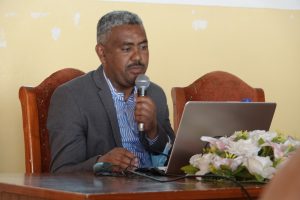Abraham Zerai Gebremariam

Bio
Abraham Zerai Gebremariam is a researcher currently working in the Archaeological Heritage Research Branch of the Commission of Culture and Sports in Eritrea. He has obtained his BA in Anthropology and Archaeology from the University of Asmara in Eritrea and his MSc in Archaeological Materials Science from the University of Évora in Portugal. Abraham has recently completed his PhD in the University of Turin, where he worked on a PhD thesis entitled “Comprehensive Archaeometric Study of Ayla-Aksum Amphorae from Adulis, Red Sea Coast of Eritrea,” in the PhD Programme Technology Driven Sciences for Cultural Heritage. His formative years elapsed between working in the National Museum of Eritrea and pursuing an Early Stage Research path thanks to the scholarships he obtained for his MSc and PhD tenure. In summary, Abraham pursues a career in the characterization of archaeological materials.
Research Profile: “Comprehensive Archaeometric Study of Ayla-Aksum Amphorae from Adulis, Red Sea Coast of Eritrea”
Methodology
Petrography, Scanning Electron Microscopy coupled with Energy Dispersive X-ray Analysis and Inductively Coupled Plasma -Optical Emission Spectrometry analyses were employed for mineralogical and chemical characterization. Moreover, X-ray Powder Diffraction and Scanning Electron Microscopy were employed to comprehend different technologies of production and micro-structural features. Organic residue analysis on some samples was also conducted using Fourier Transform InfraRed Spectroscopy (FT-IR) and Gas Chromatography Mass Spectrometry (GC-MS).
Outcome
The research allowed to resolve the question of the provenance of the Ayla-Aksum amphorae in light of the wider distribution of the vessels in the Red Sea world by adding archaeometric information from Adulis in as much as providing a chemical and mineralogical signatures of local pottery that were produced in the archaeological site. The archaeometric work also has highlighted distinction of fabrics between Late Roman Amphora 1, torpedo jars and dolia. The attribution of provenance to Eastern Mediterranean, Levant, and Indian Ocean World of the different classes of imported transport and common wares supports the notion of connections of the northern Horn of Africa with the Byzantine in Late antiquity. Late Roman and Byzantine transport and common wares that have been uncovered from excavations at Adulis are thus, particularly of interest to broaden our understanding of the extent of the trade exchanges that involved the ancient port city of Adulis. The establishment of fabrics for the local pottery are also equally important to tackle the least understood regional ceramic exchanges in the northern Horn of Africa from mineralogical and chemical studies. This study, therefore, enabled to lay the basis for building a complete ceramic sequence at Adulis from the current archaeometric data encompassing typological classification, petro-mineralogical information, geo-chemical signatures, and organic residue analysis while charting the path for future research.
List of Publications
A.Zerai, P. Davit, M. Gulmini, A. Re, R. Giustetto, L. Maritan, S. Massa, C. Mandelli, Y. Gebreyesus, A. Lo Giudice “Colorimetric Study of Ayla-Aksum amphorae from the Red Sea Coast of Eritrea” 2020 IMEKO TC4 International Conference on Metrology for Archaeology and Cultural Heritage, MetroArchaeo 2020, 415-419 (2020)
A. Zerai, P. Davit, M. Gulmini, A. Re, R. Giustetto, L. Maritan, S. Massa, C. Mandelli, Y. Gebreyesus, A. Lo Giudice ” The Contribution of Colour Measurements to the Archaeometric Study of Pottery Assemblages from the Archaeological Site of Adulis, Eritrea. ACTA IMEKO, Vol 11, No 1 (2022). ISSN: 2221-870X. http://dx.doi.org/10.21014/acta_imeko.v11i1.1094.
Tech4Culture Fellow – Call 1 (2018)
Supervisor: Alessandro Lo Giudice, Department of Physics, UniTO
